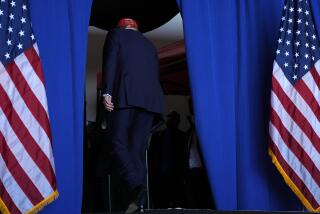Would a Fresh Face Do the Trick for GOP?
- Share via
“I believe I bring a face to the party that might be very useful these days.” So said Rep. Jennifer Dunn (R-Wash.) as she announced her candidacy for the post of House majority leader. No doubt about it: Congressional Republicans have suffered from a dearth of pleasant faces. Still, few candidates have stressed the argument for superficiality as deeply as the high-cheekboned Dunn.
Yet the surest sign that her looks-can’t-be-deceiving strategy might actually succeed at reversing the Republicans’ bad fortune was the furious reaction of liberal columnist Frank Rich in Wednesday’s New York Times. Showing more mouth-foam than usual on the subject of the GOP, Rich not only linked Dunn back to the regime of current Majority Leader Dick Armey of Texas, but also linked the entire Republican Party to “the hate apparatus” of murderers and mad bombers.
Rich’s gleeful guilt-by-association trip was just the latest nasty blast at Dunn. Hanna Rosin, writing in New York magazine last year, accused Dunn of being a Trojan Barbie Doll, who might gull good people into voting for the GOP. Under a headline, “Pretty on the Outside,” Rosin denounced Dunn for “eyelash-batting” her way to the top. “I’m rooting for Dunn to fail as the Republicans’ latest emissary to American women,” she snarled, because such failure would, she hoped, persuade the GOP to drop the whole idea of appealing to females.
Although shiny, toothy candidates have an obvious advantage in the television age, it is not true that politicians can be sold like soap or toothpaste. Instead, they must be marketed the old-fashioned way: as charming, hopefully even charismatic figures with appeal greater than the sum of their policy papers.
Consider Jesse “The Body” Ventura, newly elected governor of Minnesota on the Reform Party ticket. Definitely not a pretty face, but compelling nonetheless. On paper, this Navy SEAL turned pro wrestler turned Rolling Stones bodyguard turned action figure turned candidate was unacceptable: He had no established political base, no real executive experience and no editorial page support. Moreover, he supported medical marijuana and expanded gambling and he even floated the idea of legalizing prostitution. Yet if words mean less in the age of television, so does the purity of political platforms. Just hours after Ventura won, Republican National Committee Chairman Jim Nicholson asked him if he might be interested in switching to the GOP.
Whatever happened to “the issues”? It’s hard to remember that just six years ago, much of Bill Clinton’s political appeal was his well-known appetite for . . . briefing books. Clinton, of course, moved on to other passions, but then came Newt Gingrich, proving that sometimes, with apologies to Forrest Gump, stupid is what smart does.
The political science lesson here is that a single charismatic leader can submerge even the fiercest policy disputes under the soothing oil of shared purpose. Franklin D. Roosevelt, for example, didn’t heal the deep cleft in his own party between Northern liberals and Southern conservatives; he simply asserted that what united Democrats was more important than what divided them. And while nobody is ever likely to mistake the new Dunn for the New Deal, the FDR lesson holds true today: Bitter ideological disputes are rarely settled, but they can be bypassed in favor of more agreeable agenda items.
Consider “the Bush Boys.” Headline writers can’t resist the alliteration, while editors have already cast the gubernatorial victories of George W. and Jeb Bush as the next chapter in a multigenerational saga of politics and payback. The cover story of U.S. News & World Report asks “Can Bush Save the GOP?”; the answer seems to be yes. Remarkably, of the five pictures of the reelected Republican in Texas, four are shot from low angles, a heroic pose making George W. seem more like George Washington. With an image like that, Bush doesn’t need a footnoted wonkbook to explain what, exactly, “compassionate conservatism” means.
Some say that the modern media pride themselves on debunking heroes. Tell that to John Glenn. While some journalists are thoroughly pickled in the vinegar of their own bias, many more are swayed by the prospect of a new story, a new beginning--even a new face.
More to Read
Get the L.A. Times Politics newsletter
Deeply reported insights into legislation, politics and policy from Sacramento, Washington and beyond. In your inbox three times per week.
You may occasionally receive promotional content from the Los Angeles Times.










